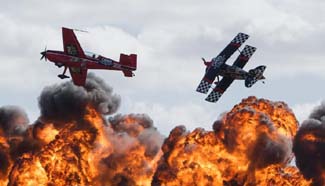
China’s navy successfully staged a live-fire combat drill within the country’s territorial airspace and waters in the South China Sea on July 28. More than 100 vessels, scores of aircraft, digital warfare units, missile battalions of the Second Artillery Force and electronic countermeasure units of the Guangzhou Military Area Command were mobilized to form the Blue and Red Forces. In a complex electromagnetic environment, both sides launched dozens of missiles, torpedoes and mines as well as shells and decoy projectiles.
The drill was designed to test the navy’s new type of combat units with the goal of winning a digitalized regional battle at sea. To secure command of the sea, both sides focused on the optimization of their combat mechanisms, digital integration, joint strikes and comprehensive defense. Political work, logistics services and integrated equipment support were tested simultaneously. Multiple methods were used to evaluate the effectiveness of mission planning as well as skills in precision command so that officers of different ranks could make the appropriate orders.
The drill set records in terms of the area of the battlefield, and also assessed capabilities of reconnaissance and counter-reconnaissance, and disruption and counter-disruption. It was closely monitored and real-time evaluations were made. The forces also made breakthroughs in trialing new tactics such as joint live-fire torpedo launches by submarines and frigates in anti-submarine conditions, anti-missile defense with new types of frigates, air interception of high-speed, low-altitude targets, blocking supersonic anti-ship missiles by surface ships, and long-distance transport of island forces.
Electromagnetic battlefield
To simulate the complicated electromagnetic environments in sea warfare, the South China Sea Fleet integrated ship-borne and missile-borne electronic interference equipment with those onshore and on target vessels. The combat was extremely tough.
Such a complicated electromagnetic environment reduced the accuracy of the weaponry, but all personnel improved their combat skills.
“Despite the low hit rate, we conducted one of our toughest drills and improved on a dozen tactics,” Commander Tian Junqing, of an aviation division of the South China Sea Fleet, said.
“To make the drill as close to possible as actual combat, we must ditch inertial thinking and avoid following the same old paths,” Zhang Hanchuan, chief of the fleet’s military training department, said. “Under a strict electromagnetic environment, the drill has helped the fleet achieve substantial progress in combat planning, reconnaissance and digital attack and defense.”

















